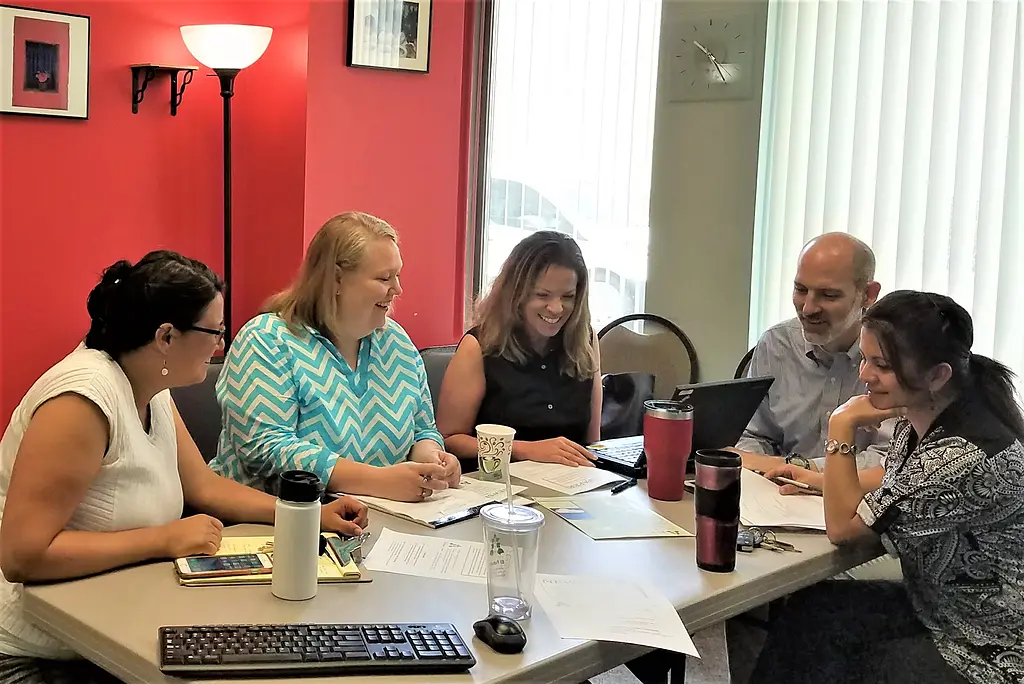Creating a national telehealth model in partnership with El Futuro
Objective
To provide equitable mental health services for underserved groups and Latinx individuals seeking therapy.
Approach
We partnered with El Futuro to create training and evaluation for reporting of their services and increase capacity and revenue while decreasing staff burnout. We led El Futuro in launching the telehealth service, TeleFuturo, to accommodate hard-to- reach groups.
Impact
Through our work, El Futuro tripled the size of its patient intake and staffing. RTI-led training expanded El Futuro’s capacity to receive grants, with the anticipation of its telehealth services becoming a national model.
Over the last decade, discussion surrounding mental health has become less stigmatized, and more people are seeking help for problems such as anxiety, depression, and post-traumatic stress. Despite this progress, many of these services are not accessible to underserved populations. For Hispanic/Latinx individuals, common barriers to therapy include language, transportation, childcare, and privacy concerns. They’re also faced with beliefs related to self-sufficiency and other cultural barriers faced by many essential workers.
El Futuro, founded in 2004, is a nonprofit organization that addresses mental well-being for underserved Spanish-speaking individuals and families. Based in Durham, North Carolina, El Futuro provides and advances bilingual and culturally informed and congruent behavioral health treatment. The group targets a mostly rural, immigrant population that includes migrant workers and essential workers with a need for mental-health services and many barriers to access. El Futuro helps solve many of the challenges facing minority migrant groups, who often cannot participate in clinical trials or even access treatment.
El Futuro is also a part of RTI’s community. In 2017, our mental health researchers became aware of El Futuro’s work through RTI president and CEO, Dr. Wayne Holden, who had already been working with the organization. El Futuro faced challenges that many community-based organizations experience, which include limited funding for reporting. Consequently, the organization had to limit the number of clients it could accept. RTI partnered with El Futuro to increase its capacity, creating a partnership that led to El Futuro’s expansion into telehealth. As a result, El Futuro has tripled its service capacity, operated throughout the COVID-19 pandemic, and attracted additional funding from various sources. The telehealth program is now a model for similar organizations nationwide.
Health Access Barriers for Migrant and Minority Groups
El Futuro has built a strong reputation with the Latino community and allied partner organizations and treats about 1,600 Latino individuals per year, including almost 600 youth. A large percentage of El Futuro clients have experienced multiple, profound, or chronic traumatic events, such as abuse or neglect, or have been victims of various forms of crime. El Futuro provides outpatient individual, family, and group therapy; case management services; and individual psychiatry. Their services are beneficial to unreached populations regardless of group affiliation.
Besides overcoming language and economic barriers when attending therapy, many Latinos are essential workers and are unable to schedule regular therapy sessions around their jobs. The nature of their job might not allow for immediate travel from work to therapy. Trauma also affects scheduling. It can be difficult to talk about intense experiences and immediately return to work because it takes time to process trauma before continuing the day. RTI worked with El Futuro by tailoring interventions to help individuals overcome these barriers.
A telehealth service closes the access gap for those seeking services who experience barriers. Patients can attend therapy sessions from the comfort of their home without interferences like a work schedule or childcare conflicting with an appointment.
El Futuro began developing its telehealth services, TeleFuturo, with funding provided by RTI. With funding from the National Institutes of Justice, PCORI and other foundations, the service expanded, aimed at serving community members who were victims of crime. RTI Senior Research Psychologist, Dr. Lissette Saavedra, led an initial grant from the National Institutes of Justice supported the launch of the program and an evaluation of its accessibility and results. The pilot study provided a framework for outcome evaluation and identified areas for improvement.
Offering Training Opportunities to Increase El Futuro’s Reach
After serving on El Futuro’s board for several years, Dr. Holden recognized that RTI’s experience in behavioral health interventions and program evaluation could benefit the organization. He saw a need for stronger evaluation and reporting – the behind-the-scenes work that could enable El Futuro to grow and serve more clients. He asked our experts to train El Futuro’s staff in more efficient ways to use electronic medical records and other systems.
This challenge is not unique to El Futuro. Community-based organizations require a substantial amount of staff time for writing and reporting in order to receive grants. If the grant is too small, the level of funding might not justify the work that goes into applying for the grant.
After going through training with RTI, El Futuro’s staff was able to complete quarterly reports from an electronic medical records system in one day instead of five. The new quarterly processing also improved efficiencies in other areas:
- Shorter wait lists and improved same-day access to appointments
- Fewer no-shows, indicating improved client engagement
- Increased revenue and third-party reimbursements
- Reduced staff burnout

RTI team collaborating with El Futuro's CEO, Director of Operations, and former Head of Clinical Services.
Relying on Telehealth to Serve Clients During a Pandemic
The telehealth program proved to be essential during the outbreak of COVID-19. Because the online services were already operating when lockdowns started, El Futuro had an almost seamless transition for employees. Using a grant from the National Institutes of Justice, El Futuro quickly built capacity across their organization. RTI worked closely with El Futuro to attend to other barriers to care, including quicker, yet thorough, assessment approaches that can operate across languages and cultures. These brief assessments are instrumental to El Futuro’s expansion, because they allow providers to fit assessments into their already limited billable time with clients.
In the early days of the pandemic, El Futuro connected with other organizations serving North Carolina’s Latinx community through the La Mesita Network. This effort, whose name means “little table,” is a network of providers that offers community-based services to Latinx people across North Carolina and beyond. The name invokes the image of pulling up a chair around a table to talk and learn together.
During a time when getting together in person was out of the question, La Mesita used virtual information sessions to support member organizations, providing resources and referrals to prevent burnout and increase the quality of services provided. Members strategized responses to the challenges of COVID-19, with information gathered from El Futuro’s telehealth program serving as a key example. The El Futuro team shared information about the telehealth program with over 185 providers throughout North Carolina.
“Perhaps one of the most rewarding outcomes of our programming is the ability to see connections being forged between agencies, institutions, and private providers across the state,” said Luke Smith, a psychiatrist and CEO of El Futuro. “As the coronavirus pandemic began taking hold in the United States, it became clear that the Latinx community would be disproportionately impacted and would require a significant response from our community of providers.”
Expansion of Capacity and Services with Telehealth Grant
The RTI team continues to collaborate with El Futuro on research on assessment and conceptualizing outcomes after treatment. One article in development involves addressing changes in depression, stress, and anxiety related to the COVID-19 pandemic among nearly 1,400 clients. The RTI/El Futuro collaborators have several articles under review in peer reviewed journals, including Journal of Clinical Psychology, International Journal of Methods in Psychiatric Research and the Journal of Rural Mental Health.
RTI and El Futuro recently received an additional grant from the National Institutes of Justice to further refine intervention components and assessment processes and cost analysis of TeleFuturo services. Since partnering with RTI in 2017, El Futuro has tripled its size of both staffing and patient intake. As El Futuro grows, they plan to become a national model for telehealth services provided to the Latinx community and unreached groups.
- El Futuro




